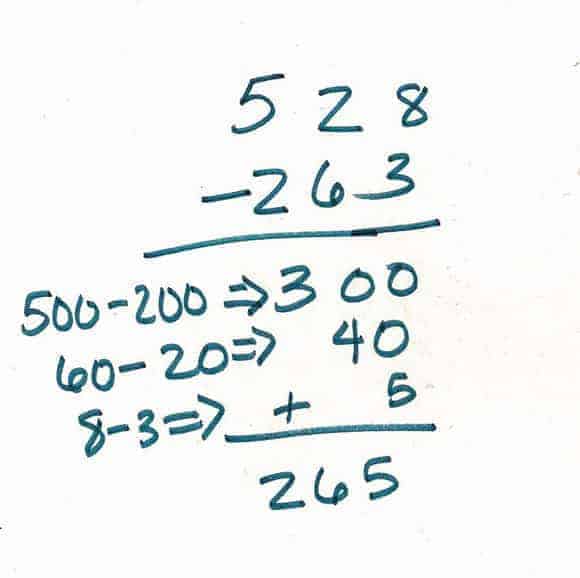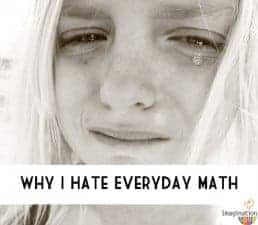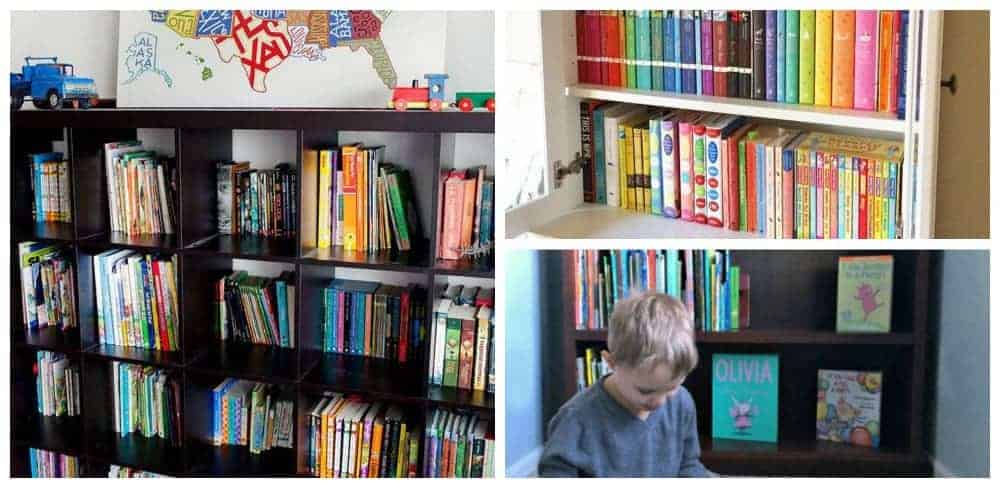Everyday Math Makes Me Want to SCREAM
This post may contain affiliate links.
I don’t normally loathe things. But I loathe Everyday Math for the hell it put my daughter through and the poor math foundation it gave her.
Thank you so much.
You Don’t Know How to Subtract, Mom
My breaking point came one Tuesday evening. My sobbing seven-year old daughter told me I didn’t know how to subtract. To learn, I needed to read the four page Powerpoint presentation on her teacher’s website. (Here’s another teacher’s Power Point.) Four. Pages. ABOUT SUBTRACTION. (But, um, I do know how to subtract, don’t I?)
So, like any normal parent, while opening up the file, I ranted on Facebook.
(Did you know there’s a Facebook support group for people like me? –Parents Against Everyday Math.)
Her subtraction was backwards.
It looked like this:

Now, this kind of method is fine for mental math, sure. But NOT for pencil and paper algorithms – it’s confusing and takes too long!
To make matters worse, it’s certainly NOT a good foundation if the math curriculum doesn’t continue like this through middle and high school. A Facebook friend wrote, “After 6 years of homework battles in elementary school, kids get to un-learn [Everyday Math] in middle school with traditional math. How does that make sense to anyone other than the self-appointed Einstein raking it in?”
Everyday Math Leaves Kids Behind
It was bad enough in first grade when AJ didn’t learn money in the one week it was taught, or time in the one week that was taught, or the addition facts when they were taught. She fell farther and farther behind with the promise that the curriculum would spiral back around eventually.
Her teachers through out these years reassured me that, she’d catch on when she was ready and that the research on Everyday Math was extensive, and it was a really a good way to teach math.
[Insert bad word here that starts with BS.]
Because those statements weren’t true. Not good research. Nor did she catch on eventually. (Google EM research and you’ll see, I’m not going to go into it here.)
Since AJ hadn’t learned the basics, she couldn’t catch on to the next spiral months or a year later.
She believed she was stupid.
Conversely, students who excelled in math weren’t challenged at their ability level and were bored. Herein lies a big problem with Everyday Math — it teaches to the middle so you hit the middle kids and leave out the rest.
Blame the Teacher?
An Everyday Math trainer told my friend that it must be because the teachers were incorrectly implementing the curriculum.
Is the curriculum that easy to mess up?
I don’t think so.
. . .
New Math
In a recent phone conversation, Audra Haskins, Director of Lower School at Aspen Academy in Colorado, explained this about Everyday Math, “It doesn’t go deep; there’s not a lot of repetition, review, or application.”
A teacher friend of mine from Twitter added, “The material jumps around so much that mastery is not achieved on any level (at least in second grade.) It doesn’t make sense. I hate it! I am worried about the future of my students because I felt like I didn’t teach solid math this year.”
Investigations is another curriculum in the New Math genre.
Haskins said, “Investigations is designed to assume the kids are good at math and know the skills and apply them. If kids don’t know it, they’re never going to get there.”
Mom of eight and blogger, Gretchen White commented on Facebook, “I LOATHE Investigations. I’ve ranted about it extensively. It’s the main reason we left our former school. I remember our 2nd grader having to count the pockets in our family for homework one night and I realized it was failing him as a mathematician. I’ve been happy with Saxon, although I know there are plenty of Saxon critics. It seems like “real” math, for lack of a better word.”
 Want to read more concerns about Everyday Math? Try Concerned CT Parent, Ed Weekly Blogger, Rational American, Amy Johnson, Andrea Merida, parents on this forum, Rox Dover, and Parent Pundit.
Want to read more concerns about Everyday Math? Try Concerned CT Parent, Ed Weekly Blogger, Rational American, Amy Johnson, Andrea Merida, parents on this forum, Rox Dover, and Parent Pundit.
To summarize,
3 Reasons I Hate Everyday Math
- Everyday Math does not teach basic number sense.
- Everyday Math makes simple math operations harder than necessary.
- Everyday Math does not differentiate for kids who need longer time or kids who need to move faster.
Cue Music, Enter . . . Singapore Math
We moved schools to one with a FANTASTIC math curriculum — Singapore Math. It goes deep into twelve concepts and teaches to mastery (meaning that kids learn it before moving to a new concept.) Tomorrow I share my happy experiences with Singapore Math. 🙂
What does your school use for math? Or homeschool? What do you like or dislike about it?







They have been using EM here in NYC public elementary school. My oldest is now in middle school, and youngest is repeating the EM torture. (M.s. is using a “glencoe math – New York mathematics” textbook) I loath EM as well. I find it (conf-)uses my kids with these alternate ways of doing things (partial sums / column methods just to name a few), and does not focus of the core way of doing the work. There are things in math that just need to be done a certain way or memorized and there are not good substitutes for them. Just tonight, my son stacked his numbers on top of each other and added and estimated everything perfectly. But his column addition method has errors.
And from past experience they will just stay on this topic long enough to confuse the kids, such that they do not master it (like all EM topics), move onto a new topic, and then repeat the same thing for the next 2-3 years. I’m tired of seeing my kids adding up nickels and dimes for 3-4 years.
No wonder our schools are producing average skills, and our president / politicians want to acquire our skilled professionals via immigration from other countries.
It’s too bad because I feel like this program could have potential but it lacks some important pieces and I’m finding myself supplementing with an older curriculum. I taught 2nd grade (hated everyday math) last year, but this year I have 3rd and so far I am liking it. I can completely understand a parent’s frustration toward to different methods of solving problems! I’ve had many parents in my classroom concerned about this!
Hmm, my 8 year old child is doing great with Every Day Math and excelling. At his school, they’ve created math groups similar to reading groups where they match kids at similar levels so they can excel or go slower as needed. He’s really into math and is a grade ahead.
I home school my daughter and we use Math-U-See and LOVE it. I feel like she is getting a good strong foundation, and things are taught in a simple manner. I did Singapore math with her in Kindergarten and we enjoyed that too but prefer the Math-U-See program now!
The district I teach in uses Investigations. I HATE it! And so do most of the teachers I work with. While I think it does a great job of teaching strategies for mental math (as you mentioned above), I think it’s crazy to only teach these strategies and not teach traditional math. Like you mentioned in middle school and high school they go back to the traditional method and the kids are completely lost. I teach special education and fortunately I use a curriculum that teaches the traditional way. Unfortunately many of the student I see for math wouldn’t need to come to me if we used a traditional math curriculum!